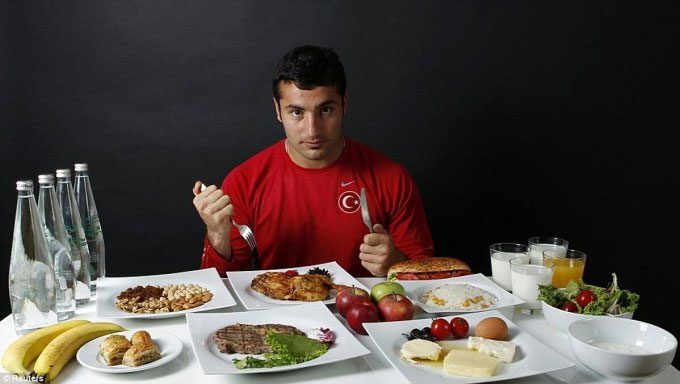Sports superstars often consume more calories and carbohydrates at breakfast compared to the average person, depending on their physical condition and the sport they compete in.
Each athlete has a different breakfast regimen, tailored to their weight, physical condition, and sport. Their three basic rules are to eat for energy, to recover, and to consume health-promoting foods.
What do athletes eat for breakfast?
Chef and nutrition expert Brittany Dunn notes that athletes’ breakfast choices are often calculated based on the specific sport they participate in.
“I once worked with someone who liked to have two boiled eggs with peanut butter toast and a cup of coffee in the morning. Another athlete preferred smoothies and stir-fried vegetables, while some liked sandwiches and potato cakes,” Dr. Dunn said.
She explained that all these breakfast options provide sufficient nutrients and essential micronutrients. Breakfast choices depend on personal preferences, dietary plans, the time between meals and subsequent training, body composition, and the sport.
As competition days approach, athletes often avoid trying new foods for breakfast to minimize risk.
“Many athletes have specific, fixed meal plans for competition days,” Dr. Dunn noted. Most athletes eat the same type of breakfast before each competition, helping them feel more relaxed on game day.
What can the average person learn from an athlete’s diet?
The key to healthy eating is controlling carbohydrate and calorie intake. Athletes need to consume more calories than the average person. Some may add around 1,000 calories after each training session and have three to four snacks throughout the day. The goal is to maintain body composition and replenish energy.

An individual athlete needs to consume between 6,000 to 8,000 calories per day. (Photo: Reuters)
Eating multiple meals is relatively common among athletes due to their high caloric needs. Coaches sometimes have them drink fruit juice or even eat candy to stimulate appetite.
According to Dr. Marc Bubbs, a nutrition expert who has worked at the Olympic Games, the higher the training intensity, the more individuals rely on carbohydrates. Therefore, professional athletes need to consume more carbs than the average person.
“A cyclist or swimmer may need between 6,000 to 8,000 calories a day (depending on training intensity). Meanwhile, team sports like soccer and basketball require about 3,500 to 5,000 calories,” Dr. Bubbs said.
At the Beijing Olympics, athlete Michael Phelps drew attention when he revealed that he consumed 8,000 to 10,000 calories a day for training. In reality, when training for over 90 minutes or working at high intensity, the body requires adequate nutrition to maintain and recover quickly.
For non-professional athletes, experts recommend maintaining a diet rich in healthy fats, protein, fiber, and moderate carbohydrates.
“These nutrients help build muscle, reduce inflammation, support the absorption of vitamins and minerals, and help maintain a feeling of fullness until the next meal,”
Dr. Dunn said.
She suggests several suitable breakfast foods such as yogurt, mixed nuts (granola), berries, whole grain cereals with fruits and milk, protein powder, and oatmeal.
For active individuals looking to establish a long-term healthy menu, Dr. Bubbs recommends including at least 20 grams of protein in breakfast. Specifically, men should consume 30 to 40 grams, while women should aim for 20 to 30 grams. According to research from the Academy of Nutrition and Dietetics, each person should consume 2 grams of protein for every kilogram of body weight.
Those looking to lose weight or improve blood sugar levels should reduce carbohydrates at breakfast. “Eat more berries instead of bananas, and cut down from three to four slices of bread to just one slice,” Dr. Bubbs advised.
Individuals who exercise in the morning will have different dietary needs depending on their type of workout. Those doing aerobic exercise may skip breakfast or eat fewer carbs. However, those engaging in high-intensity training (HIIT or cardio) should have a full breakfast with sufficient carbohydrates.



















































